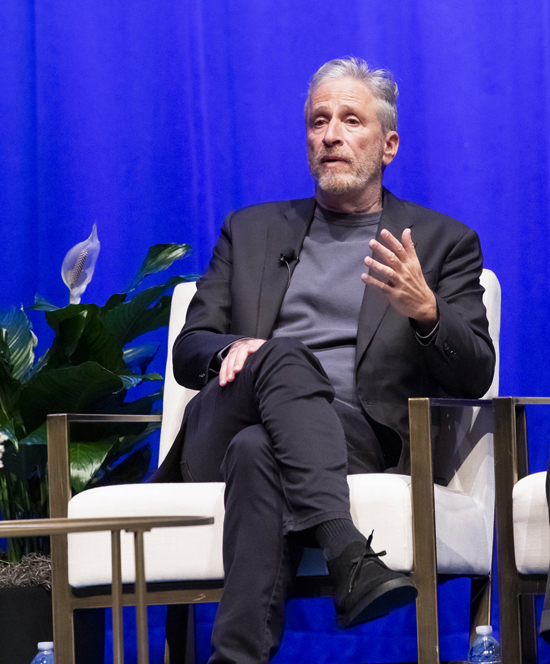
Comedian, talk show host and advocate Jon Stewart spoke last week to a crowd of Vanderbilt and Meharry medical students, nursing students, faculty and staff about his approach to advocacy and how those in the medical community can find their own place alongside those supporting a cause. The event was part of the Flexner Deans’ Lecture Series at Vanderbilt University.
“The first thing is to realize that you can’t divorce medicine from society,” Stewart told the audience. “It is all interconnected. Race, gender, class, nutrition, health, education — it’s all medicine. You’re at the hub of all that happens in our society. You’re able to see the intersection of all those things. You’re able to see what poverty does to a person and their health. You’re able to see how class influences the outcomes of different interventions and the injustice of that. You see that, and you’ll be dealing with it.
“You may actually feel yourselves callousing over to it. That’s something that you have to fight. You are a part of systems, and those systems are flawed. And you have to try not to let yourself be captured by the institutional nature of those systems.”
Stewart’s own advocacy became headline news when he pushed Congress for federal funding to provide health monitoring and medical care for survivors, first responders and volunteers exposed to toxic pollutants following the Sept. 11, 2001, terrorist attack on the World Trade Center. He could see the twin towers from his New York City apartment.
The James Zadroga 9/11 Health and Compensation Act of 2010 was passed to provide that care. Stewart then fought for the law’s reauthorization in 2015 and testified before the House Judiciary Committee when continued funding for the benefits was threatened in 2019.

Stewart was then contacted by Rosie Torres, the wife of veteran Leroy Torres, to ask if he would extend his advocacy to help veterans suffering from health issues due to exposure to airborne toxins. That exposure was largely from burn pits during deployment to Iraq and Afghanistan, and the toxins were similar to those released on 9/11.
Stewart soon became one of the loudest voices advocating for an expansion of health care benefits for an estimated 3.5 million of veterans exposed to burn pits. The data that proved veterans could have lung damage due to the toxic exposure was largely provided by pulmonologists and researchers at Vanderbilt University Medical Center.
This VUMC team, spearheaded by Robert Miller, MD, professor of Clinical Medicine in the Division of General Internal Medicine and Public Health, worked tirelessly for 18 years to provide the evidence that reinforced Stewart’s argument for legislation to aid the veterans.
In August 2022, the Sgt. First Class Heath Robinson Honoring Our Promise to Address Comprehensive Toxics Act, otherwise known as the PACT Act, was signed into law.
As Stewart peppered his comments with his trademark quips and humorous asides, he shared insight on how to approach activism for a cause. He said the practice of providing health care was a great model for how to be an advocate.
“First, you have to diagnose the problem and agree on the problem,” he said. “Then, you talk about the medicine and find some like-minded people that believe in the same medicine. Then you start to strategize together on how you can deliver that.”
An audience member voiced concern that the expertise of the medical community was devalued during the COVID-19 pandemic as misinformation and disinformation caused many to turn away from the advice of their health care providers.
“Here’s what you can do about it,” Stewart advised. “Don’t be scared. Don’t be bureaucratically timid. Don’t be protective of institutions to the point that you’re not telling the truth. You’re not going to get everybody, but the vast number of people that are still ‘gettable’ need to be treated like they’re smart. And like they’re adults.”
Another attendee asked how Stewart stayed informed on issues when an overabundance of social media and other information sources continually compete for attention.
“The immediate environment we live in at this point is just a firehose,” Stewart said. “We have more information and less knowledge than I think we’ve ever had in the entirety of the world. I think it’s important that schools teach people how to filter information because otherwise they’re just going to fall prey to the polemics and the weaponized nature of it.
“Remember, the economics of media is not clarity; the economics of media is engagement. Media is built for 9/11, but in the absence of 9/11, they have to create a catastrophic urgency. Otherwise, you’re going to live your lives, and they can’t have that.”
Before the panel discussion, Stewart met with the VUMC pulmonologists and researchers whose research provided the critical data linking the airborne toxins veterans were exposed to during deployment to extensive lung damage.
“I just wanted to thank them,” Stewart said. “When you’re working in a lab, you’re somewhat removed from the actual real-world effects of some of the things you’re doing.”
Stewart stressed that advocacy can be pursued in many ways, with each approach playing a critical role.
“Not everybody needs to be going down there yelling and screaming,” he said. “Being an advocate doesn’t necessarily mean sleeping on a park bench in front of Capitol Hill. What worked for me was knowing some of these really talented, smart people and being able to lean on them when I was getting questions. They were arming me and allowing me to go forward with the right information. I worked with great allies.”











